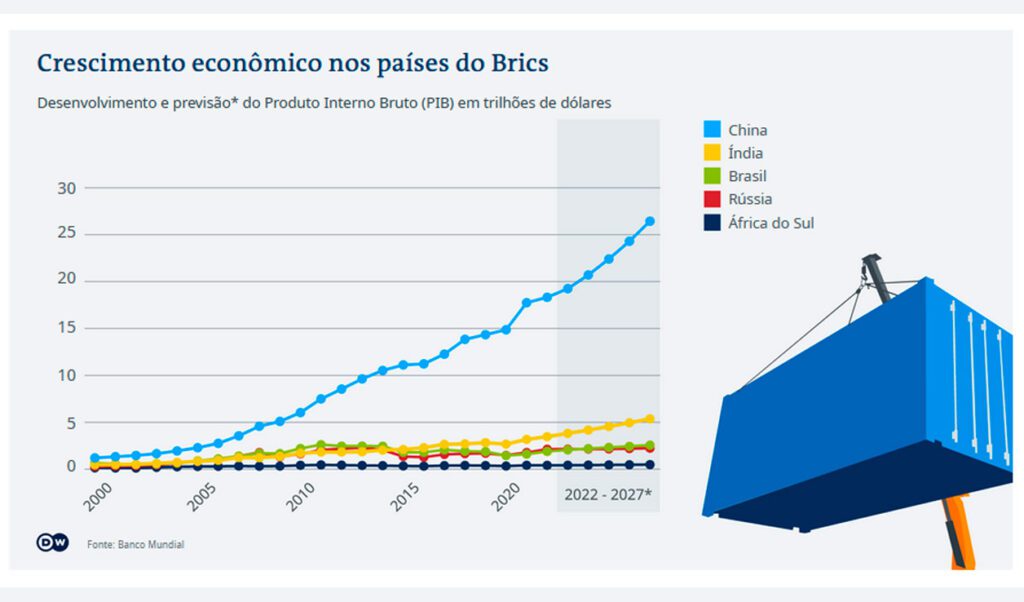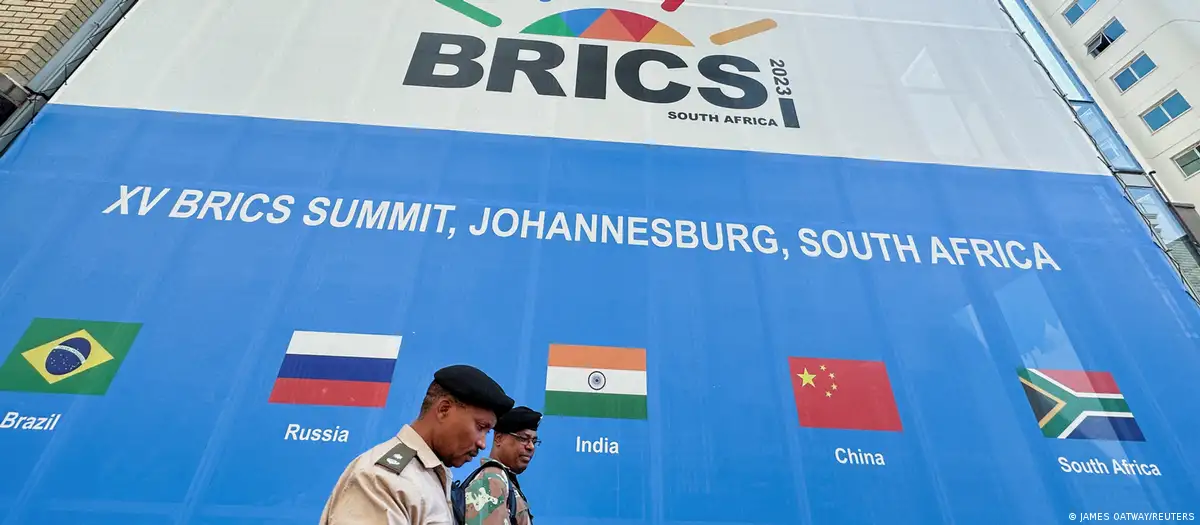The summit in Johannesburg will discuss the accession of new members to the bloc and the creation of alternatives to the dollar. Decisions will signal the future of the group, the strength of China and the role of Brazil.
(DW) The chances are high that the BRICS will gain new letters. The inclusion of more countries in the group, which currently includes Brazil, Russia, India, China and South Africa, is one of the main themes of the summit taking place this Tuesday to Thursday (August 22-24) in Johannesburg.
Another central issue will be the creation of alternatives to the dollar for international transactions, such as the use of the countries’ own currencies in bilateral trade or the creation of a BRICS monetary reference unit.
Both topics are complex to implement and are not unanimous among the members. Depending on how they are handled, they will shape the future of the bloc, originally created to strengthen a multipolar order and push for reform of global governance.
What’s at stake
Since 2009, when the group held its first summit, the polarization between the United States and China and Russia’s invasion of Ukraine have reshaped world geopolitics, and the BRICS – now being reinvigorated – is part of this scenario.
The authoritarian governments in Beijing and Moscow have been promoting an open challenge to the West and want to mobilize BRICS in this endeavor. Brazil, India and South Africa – three democracies, albeit imperfect ones – have an interest in maintaining good relations with both sides of this new Cold War.
In addition to the expansion of the BRICS and the de-dollarization of transactions, the meeting is expected to discuss the repercussions of the war in Ukraine on food security, which is particularly affecting the countries of Africa, where the summit is being held this year.
The meeting will be marked by the absence of Russian President Vladimir Putin. He is the subject of an arrest warrant from the International Criminal Court, and as South Africa is one of the court’s member countries, it would in theory be obliged to arrest him. Moscow will be represented by its foreign minister, Serguei Lavrov.
Among the BRICS members, Brazil is no less influential than South Africa in terms of population, economy and military power. But it is especially important in debates on the environment and international trade.
Criteria for expansion
Born as Bric, the group only incorporated the S of South Africa later, in 2010. Today there are at least 20 more countries wishing to join, including Argentina, Egypt, Indonesia, Iran, Saudi Arabia, the United Arab Emirates and Venezuela.
China and Russia are interested in expanding the BRICS to make it an alternative to the G7, the group of the world’s seven most industrialized liberal democracies.
South Africa, Brazil and India were not as enthusiastic about the expansion, but have indicated that they may accept it by negotiating the criteria and which countries will be accepted.
It is being debated, for example, whether the new members would be full members, or whether a new category of associated countries would be created.
Reformist or anti-Western
Vinicius Guilherme Rodrigues Vieira, professor of international relations at FAAP and FGV, told DW that China’s aim is to use the BRICS to bring into its orbit countries more aligned with authoritarian regimes “to advance its ambitions to buffet the West” and dilute the power of the other current members of the bloc.
It would be especially advantageous for Beijing and Moscow to include autocratic countries, such as dictatorships in the Middle East, he says.

Itamaraty had been opposing the expansion so as not to lose influence. Recently, however, President Luiz Inácio Lula da Silva defended the entry of Argentina, the United Arab Emirates and Saudi Arabia. Decisions are taken by consensus, but China has great power to persuade others.
Vieira believes that it will be up to Brazil to influence the profile of the new members, and that it would not be in the country’s interest for the bloc to follow a path of “explicit anti-Westernism”.
Felipe Krause, professor of Latin American studies at Cambridge University in the UK, summarizes three possible positions in this scenario.
The challenger, promoted by China and Russia with the aim of “overthrowing” the current world order. The skeptical one, which recognizes the problems of this order but prioritizes the need for Brazil to diversify its relations and advocates “staying on the fence”. And the reformist, which is more pro-Western and prefers to dedicate itself to improving current global governance.
He believes that the current Lula administration’s foreign policy discourse is now closer to the challenger view, which could pose risks for Brazil.
“We don’t have the economic and political power to have a more forceful discourse against the West. We would do better by trying to be more on the side of the international liberal order and reforming its imbalances,” he says.
Alternative to the dollar
The dollar has been the main currency for use in international transactions and as a store of value since the end of the Second World War, largely replacing gold. This has given the United States economic advantages and empowered Washington to use its control over the currency to apply international sanctions, as has been done against Russia.
Leaders from various countries have been advocating the creation of an alternative to the dollar, which has also been one of Lula’s flagships in his international policy since he took office in January.
This has already been tested in bilateral relations. In April, during Lula’s visit to Beijing, Brazil and China signed a memorandum of understanding to strengthen their trade in local currencies, without the need to use the dollar.
Applying the idea within the Brics framework would be more complicated. The final declaration of the summit in Johannesburg should bring something new, such as the creation of a working group to draw up a proposal.
This idea is viewed enthusiastically by Russia, which faces restrictions on the use of the dollar, and by China, which is discussing using its centralized digital currency for international transactions.
One possibility would be to create a new monetary reference unit or currency for exclusive use in exchanges between the BRIC countries or those of the BRIC Bank (NDB), which also includes Bangladesh, Egypt and the United Arab Emirates.
The creation of this new currency is viewed with skepticism by some – including the former Goldman Sachs economist who coined the term Brics, Jim O’Neill, who called it “unfeasible”.
Even if it is created, there would be a new problem, says Krause – the tendency would be for China to be the actor with the most influence over this currency. “The problem with dollarization is that you are exposed to the Fed’s decisions for all kinds of international transactions. But if you make a common BRIC currency, you’re kind of transferring the strength of the dollar to the strength of the yuan [China’s currency, also called the reminbi].”
He points to other more viable alternatives, such as the BRICS countries strengthening bilateral transactions between them in local currencies, or the NDB making loans in local currencies.
Brazil’s balance
Vieira doesn’t expect any major decisions from the summit, but rather a final communiqué that supports the use of local currencies in commercial transactions.
On Brazil’s part, he believes that the country has strength in environmental issues and should try to use the BRICS to “point the finger at the Global North to make the necessary compensations” in the fight against global warming.
He also believes that the country will do its “utmost” to ensure that BRICS does not take a clearly anti-Western stance, “not out of benevolence to the West, but because of its interests”.
“In the short term, the PT’s vision of diplomacy has strong traces of anti-Westernism. What saves Brazil’s diplomacy are its long-term interests, as well as the vision not of the PT, but of President Lula as a former union leader who wants to talk to everyone,” he says.
On the other hand, he says that China itself has limitations in pushing ahead with its BRICS agenda, because it knows it needs allies in the Global South and doesn’t want to alienate them. But if Beijing insists and achieves its goal, it would be up to Brazil to strengthen its autonomous diplomacy to protect its interests and push for reforms in global governance, he says.
